- Home
- William Shatner
Live Long and . . .
Live Long and . . . Read online
Begin Reading
Table of Contents
About the Authors
Copyright Page
Thank you for buying this
St. Martin’s Press ebook.
To receive special offers, bonus content,
and info on new releases and other great reads,
sign up for our newsletters.
Or visit us online at
us.macmillan.com/newslettersignup
For email updates on William Shatner, click here.
For email updates on David Fisher, click here.
The author and publisher have provided this e-book to you for your personal use only. You may not make this e-book publicly available in any way. Copyright infringement is against the law. If you believe the copy of this e-book you are reading infringes on the author’s copyright, please notify the publisher at: us.macmillanusa.com/piracy.
I would like to dedicate this book to an old, old friend who is no longer with us. Carmen La Via was a young agent in Los Angeles when I arrived on the scene. We went through many manifestations of client/agent/friend. He moved to New York and he became my literary agent. We did a lot of work together, much of it really good. To show you how tough he was, at one point he had a “Do Not Resuscitate” sign posted on his door. He was given last rites and was given up for dead. But that tough little Italian guy floored us all when he came back to work. People want to put on his gravestone RIP. I think it should be DNR. I am waiting for him to visit with me in spirit.
1. A Fortunate Life
I HAVE LIVED a fortunate life. I, literally and proverbially, have been to the mountaintop. I have met the most extraordinary people and enjoyed the most amazing experiences. I have ridden horses across prairies and motorcycles across the country. I have watched the miracle of my children growing into adulthood. I have lived the entire spectrum of emotions; I have felt tremendous joy and the deepest pain; I have loved and hated; I have gone to the extremes and savored passions. I have felt ecstasy. I was born in 1931; in my lifetime I have witnessed the discovery of antibiotics and the elimination of dreaded diseases, I have seen the inventions of television and the internet and the microwave; I have watched with awe the growth of commercial aviation as well as the NFL. Mine has been a life that has spanned eight decades of excitement and discovery and relationships and a lot of luck.
So I sure wasn’t ready for it to end.
I have also seen death in its many forms. I have seen death in the natural order of things as my parents aged and died. I have seen the tragedy of accidental death as my wife died in a truly tragic event. I have seen the close and painful death from disease of my close friends. I have held my dying animals in my arms as their life slipped away. I have felt the pain of loss, the emptiness. I have attended more funerals than I can count; I have searched for the right words to console countless bereaved people. I have wandered aimlessly trying to comprehend death, realizing I could never understand it. But in 2016 I had an entirely different encounter with death.
I was told by a doctor I had a terminal disease. That I was going to die.
Wait a second. This was something completely different. I had gotten very good at being sympathetic; I was the one who always went home at the end of the funeral. I didn’t know how to react to this news. This truly was my funeral we were talking about.
“You have cancer,” the doctor told me.
There must be some mistake, I thought. This is what happens to other people. This diagnosis was the end result of a chain beginning with my curiosity. While reading a magazine, I had learned that researchers had discovered that cancer cells give off a protein that essentially announces their presence. Scientists had developed a test that can search out this protein. It is an extremely sensitive test. My wife, Elizabeth, and I decided to take this test. When it revealed that she had cervical cancer, we went through a month of near hysteria, but other doctors ran more thorough tests and found nothing. That test was too sensitive, they told us.
And then I was diagnosed with prostate cancer. Me! My regular doctor explained that prostate cancer sometimes is very aggressive and sometimes is so benign you’ll die of something else long before it kills you. Kills me? That couldn’t be happening. To find out which type it was, he took my PSA, a marker for this disease. Until then it had been at one or two, well within safe limits. “It’s ten,” he reported. “That is an aggressive cancer.” Ten! My body had betrayed me.
I have always felt like the great comedian George Burns, who lived to one hundred: I couldn’t die as long as I was booked. And my schedule was too busy for me to find the time to die. On an intellectual level, I understood my prognosis; I had made out my will, which said that when I died this person got this, that person got that. But on an emotional level, I was certain I was never going to die. I denied it. To me, it was make out my will, then have a nice piece of strudel. Death didn’t apply to me.
I remember noticing in the last few years that when I made personal appearances more and more people were asking more frequently and passionately for my autograph. I knew what that meant: They were expecting me to die soon and my autograph was suddenly going to become more valuable. Boy, I thought, am I going to fool them!
My initial reactions to the diagnosis were, I suppose, quite common: denial, fear, anger—as well as a dose of being insulted. I am in my eighties; I have lived a long life, but I certainly wasn’t ready for it to end. I decided I wasn’t going gentle into that good night. I was going to fight. I had new horses arriving and I had to ride them. I had personal appearances scheduled and my one-man show to do and I couldn’t let down the audience. I was going to make a movie. And I was supported in a sea of love: my wife, children, my grandchildren. I have always believed there is a force that burns inside all of us, a burning desire to live that permeates all our cells, and I tried to ignite that. I tried to find the trigger to put my immune system in superkill mode. I don’t have any idea if it helped or not, but I believed my immune system got fired up! I was not going to die easily.
Then I read that in certain cases testosterone supplements might have something to do with prostate cancer. I was taking them. I asked my doctor if I should stop taking the supplements. “Yeah,” he agreed, “that would be a good idea.”
I stopped. Three months later I took another PSA test. It had gone down to one. One. The doctor guessed that the testosterone had resulted in the elevated PSA level. I didn’t bother taking the sensitive test. As the cancer specialists explained to Elizabeth and me, we get cancer cells all the time and usually your body eats them up. Your killer cells, T cells, attack and destroy them. The body gets cancer all the time and eliminates it, but that test is so sensitive it picked up the hint of it and combined with the PSA reading convinced me I was dying.
And while I was sorry to disappoint all of those people with my autograph, I was thrilled to learn I did not have cancer. I’m back to not dying. At least right away.
But during those three months I was living with my death sentence, I spent considerable time thinking about my life, about the lessons I’ve learned, the places I’ve been, the miracles I’ve seen, all of those encounters and events and experiences that have been wrapped together into one great burst of energy called life. And based on that I want to share with you, for the first time, my secret to live a good, long life:
Don’t die.
That’s it; that’s the secret. Simply keep living and try not to slow down.
Many people have shared their secrets to a long and happy life. Do this; don’t do that. Eat pickles. Don’t eat pickles. And every one of them has worked—for them. Other people have passed along the wisdom they have gained. Meditate. Don’t hold in your anger. Treat people as you want to be tre
ated—unless you don’t like somebody; then treat him or her differently. It all works; none of it works. In these pages I am going to tell you about those things that have worked for me, that have enriched my life or taught me lessons that made a difference. But here is the first of those lessons: One size doesn’t fit all.
When people come to me and ask for advice, assuming I must have learned something vitally important in my lifetime, I respond with the best possible advice: Don’t follow my advice. Each one of us is unique. Different. Not the same. You didn’t have my mother. No one else can walk in my shoes; most people can’t even fit into them. I can’t wear your shoes; they make my bunions pinch. But why try? We each bring to every day an entirely different set of experiences and a unique personal point of view. We each see life through a different prism. We are physically, emotionally, and mentally different. We think and see and feel the same things differently. The breeze, the sensation of putting oil on my skin, the anger I feel when some driver cuts me off, my response to a joke or a movie—it’s different, all of it.
For me, really for anyone, to try to tell anyone else how to live their life is the ultimate in hubris. There is no one way, or right way, to do anything. Is there only one path up a mountain? Is there only one way to maintain your health? Is there only one way to have a relationship, or are there many and they vary depending on whose shoes you have on your feet? I don’t have those answers; maybe the holy men on the top of the mountain do. But they’re living on top of a mountain; what could they possibly know about responding to a jerk who cuts you off when you’re driving to Starbucks to get that first cup of morning coffee? Is there such a thing as mountain path rage? The point I’m making is that I am not a font of wisdom. I’m the guy who saved the Starship Enterprise for seventy-nine weeks and ended up kissing James Spader on a patio. I’m still asking the questions. Even at my age I am still trying to figure out how to make this strange, wonderful, bizarre thing called life work best. I do know what has worked for me and I’m pleased to be able to share it. Take from it what it’s worth—which in real terms is the price of this book, less the discount.
I have enjoyed incredible fortune in my life and I have had opportunities that few other people have enjoyed. What I believe is we should all be gathering knowledge, as much knowledge as we can, like prehistoric man gathered food, and from that huge pile sift and use those things that make sense to our own lives.
With age supposedly comes wisdom. I read that a long time ago. But I am now deep into my eighties and I can with some sadness admit that I know very little. I have gained only enough wisdom to dismiss the belief that wisdom comes with aging. With aging, mostly, comes aches and pains. At times I feel as uninformed as I felt when I left the city and went out into the country for the first time in my life. I had grown up in Montreal, a great city of bright lights. In a city it’s almost impossible to see the fullness of the night sky. But when I was eleven years old I was sent to a camp for children who didn’t have a lot of money. I wandered out of my bunk one night and sat on a log and looked up, and for the first time I saw the enormity of the universe. I literally looked up and up until I fell over backward, overwhelmed by the vastness. I had no idea, no concept. I don’t think I have ever lost that awe, or the desire to understand more about it than I do. I have spent my life searching for those answers, and I am still on the job. The only thing of which I am certain is that those people who make a living telling others that they have the answer don’t have the answer.
Change is the only thing we can predict with confidence. What you know for certain, those things on which you base your decisions, are going to change. We are told to eat a lot of carbs and few proteins, but just a few years ago we were told the opposite. Avoid fats, the experts told us; now we’re told some fats are healthy. Einstein told us the speed of light is exact, and that will never change, but who knows? Someone may find the speed of light varies. We’ve just discovered that there is a wobble in the gravitational center of Earth and it affects everything. Years ago people confidently planned for their future, picking a profession and studying for it and working hard at it only to discover years later that this profession no longer existed. Technology had replaced it. The path that people had pursued so diligently and in many cases had become expert, had come to a dead end. Even the greatest typewriter repairman in history became obsolete with the availability of the computer. For survival, it became necessary to change.
If I do have any wisdom at all it is limited to the area of my own experiences. For me, the best that I can do is reminisce about what I have learned and allow you to choose those things that may apply to you. That’s really all I have to offer. Here’s what happened, here’s what I did, and here’s how it turned out. I can’t teach you; I can only say this was what worked—or in some cases didn’t work—for me.
There has been some advice that made an impact on me. Someone, I’m not even certain who it was, told me once, “You have the career that is your career. It is the career that you deserve. It is, in effect, your journey in life and…” My career? My career and my plans have always been dependent on the next phone call. And I never knew when—or even if—the phone was going to ring. We are under the illusion that we choose our path, but we don’t. The road isn’t even paved. The road is being tarred as we go along. Those big rollers are just ahead of you and you walk along the road that you think you have chosen, but in effect you have little control over your life. Circumstances visit and you go along. You follow the winding road, you make some choices, but for the most part we are dependent on factors not under our control. Things happen. I never thought I would be an actor. I never thought I would make albums or write books. I never thought I would make speeches on subjects I had to research. All the various things that I have done—the acting, the traveling, the music, the books, the horses and motorcycles—all were not things I dreamt of doing. The opportunities presented themselves and I embraced them.
We are all called upon to make significant and often life-changing choices, and when that becomes necessary we spend a great deal of time wondering and worrying and pondering, trying to figure out all the angles, trying to make certain we make the best choice. This job or that job? Marry this man or woman or not? Accept this offer? Which is the choice that will lead to riches or happiness? Which one will lead to doom and decay? Here is one thing I’ve learned: There is no such thing as the best choice. There is no sure thing. There simply is no way of knowing what fate has in store for each of us.
I remember being at one of the crossroads of my life and having to make a decision. After I finished Star Trek, my career hit what actors refer to as a “respite,” a brief lull, but what it actually means is you can’t get a job. So I started working in summer stock. I traveled in a truck with my dog. I had put a shell on the truck bed, it was a sort of crawl-in cottage, and when I reached the next theater, rather than spending money on a hotel or motel, I would park my truck in the back of the parking lot, hook it up to an electrical supply, and live there for the run. I did that for three years.
When the season ended in September, I drove home to Los Angeles. We finished the second summer in Boston, and I took off, intending to drive cross-country in time to be home to celebrate the Jewish holidays with my three daughters. Sometime on the first day I stopped and did what every actor did every day—I called my agent. Just in case. This was long before cell phones, so I called him from a pay phone in a rest area. “Big news,” he told me. “Rose Kennedy wants to invite you to a party at the Kennedy compound. Turn around and drive back to Boston.…”
The Kennedys wanted to invite me to a party? On the one hand, that was a big deal. I had no idea who else would be there. But on the other hand, I desperately wanted to see my kids. I was really torn, but finally I told him, “I can’t make it; I’ve got to get home to see my kids.” His best efforts to convince me failed.
I called him again two days later from Arizona. “Rose Kennedy’s office called. They really
want you at that party, Bill. They said they would send an airplane to pick you up, then fly you home.”
The Kennedys were the most powerful family in the country. They were well connected in Hollywood. What I should have said was “I’m in Arizona. Get the plane here and we’ll fly to L.A. to pick up my kids and I’ll take my kids to the party.”
That’s what I should have said. What I did say was “I have to get home to my kids.” I had a choice and I made it. When I got home, my children were absolutely thrilled to see me. I remember their exact words: “Oh, hi, Daddy. We’re going to go out and play now.”
Who knows what might have happened if I had made a different choice and attended the Kennedy party? I might have met a producer there who realized I was the actor he had been searching for and immediately cast me into his big-budget extravaganza. And then that movie tanked and I never got another job again instead of working steadily and having a long and successful career.
I have spent my life being an actor. Is there a less predictable profession? The road is often being laid just one day ahead of you; there are times you have to live in the back of a truck with your dog and wait for the road to catch up. In the 1960s, one of the great radio and TV writers, Norman Corwin, was commissioned by the University of Utah to write a play. I had performed in a number of TV programs he’d written. He wrote a wonderful play and told me he had written it with me in mind. It was extremely flattering. It was a beautiful play and I did it in Salt Lake City. I remember meeting a professor of Shakespeare at the university and inviting him to see the play, telling him that there were passages in it the equal of Shakespeare. He scoffed at that—until he saw the play. Then he told me that “there were moments that had the poetry and gravitas of Shakespeare.” The play was very well received and it appeared it was going to move to Broadway. Just about then I got a phone call telling me the pilot I had made for a TV series called Star Trek had sold. What if I had gone to Broadway instead of taking that job? There was no way for me, or for anyone, to have predicted what would happen. I could have spent days and weeks and months pondering every element of that decision and it would have made no difference.

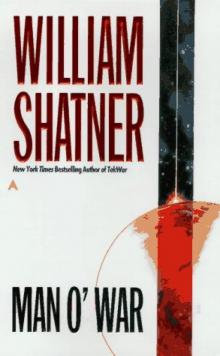 Man O' War
Man O' War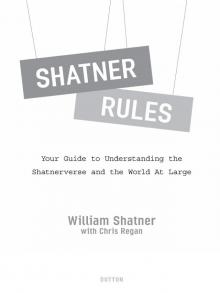 Shatner Rules
Shatner Rules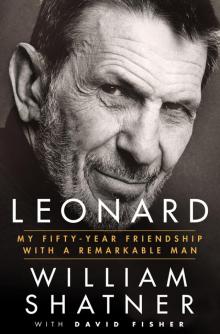 Leonard
Leonard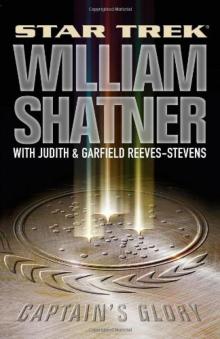 Captain's Glory
Captain's Glory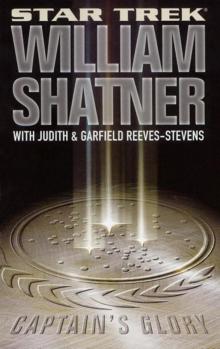 Captain's Glory зпвш-9
Captain's Glory зпвш-9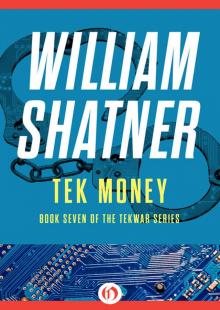 Tek Money
Tek Money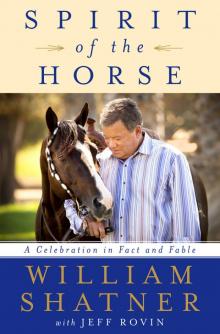 Spirit of the Horse
Spirit of the Horse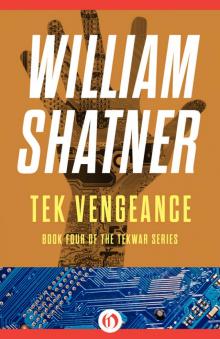 Tek Vengeance
Tek Vengeance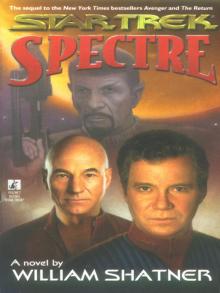 Spectre
Spectre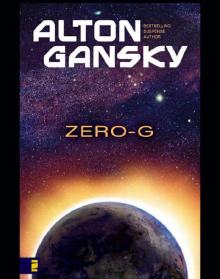 Zero-G
Zero-G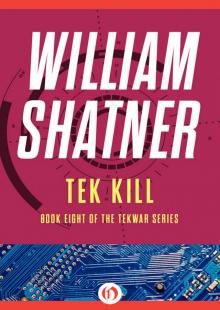 Tek Kill
Tek Kill Collision Course
Collision Course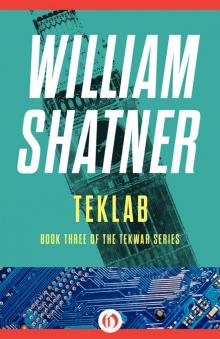 TekLab
TekLab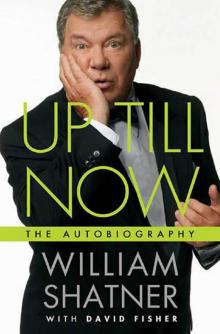 Up Till Now
Up Till Now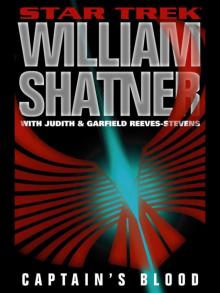 Captain's Blood
Captain's Blood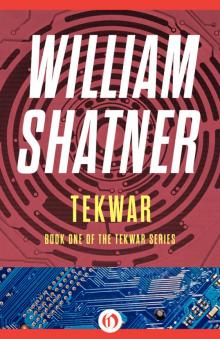 TekWar
TekWar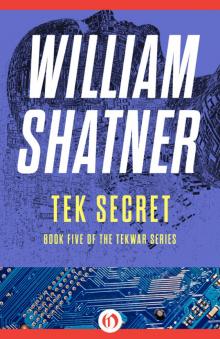 Tek Secret
Tek Secret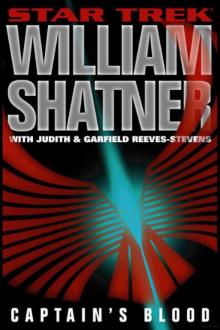 Captain's Blood зпвш-8
Captain's Blood зпвш-8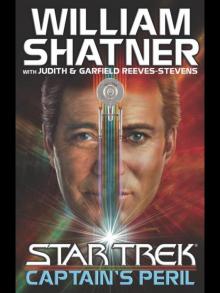 Captain's Peril
Captain's Peril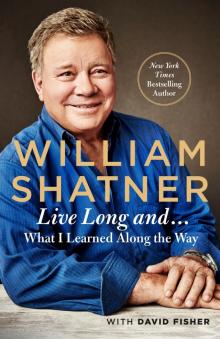 Live Long and . . .
Live Long and . . .